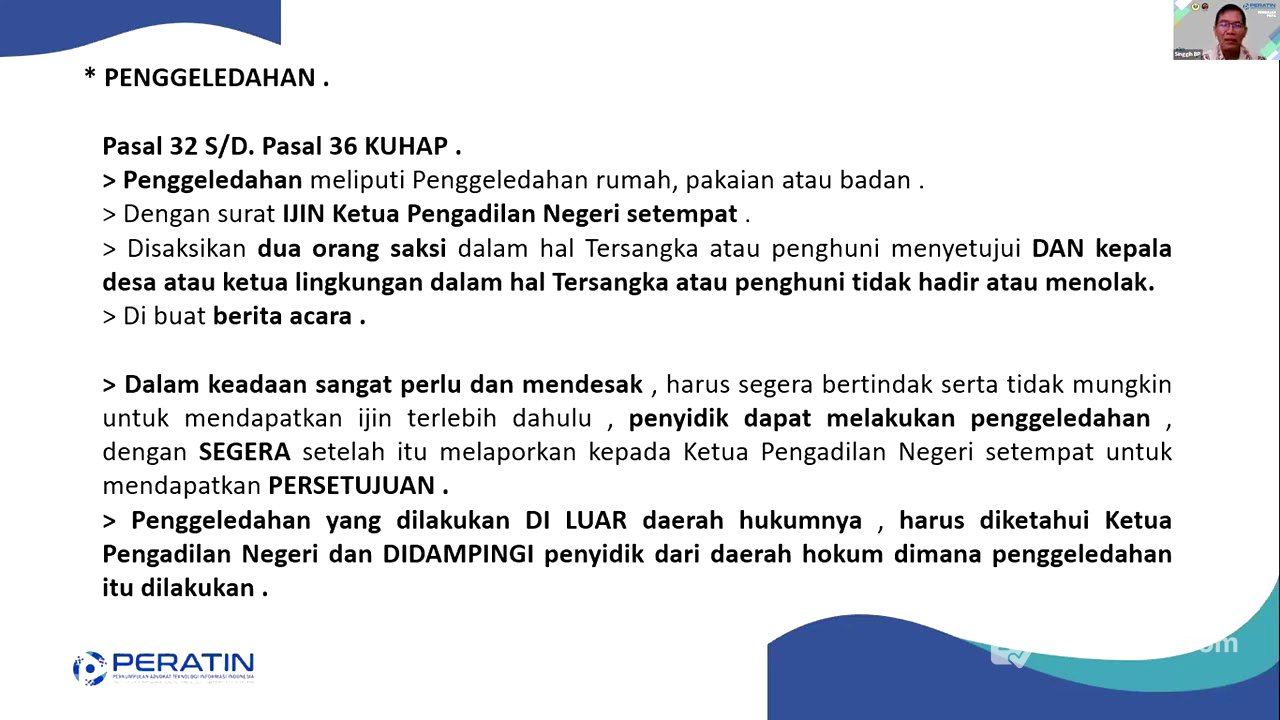TLDR;
This YouTube video features a presentation and Q&A session on criminal procedural law. The speaker, Singgi Budi Prakoso, a High Court Judge, shares his expertise and insights on various aspects of the law, including arrest, detention, searches, seizures, rights of suspects and legal counsel, pretrial procedures, restorative justice, and evidence. The session includes a detailed discussion of recent court decisions and their implications for legal practice.
- Criminal procedural law implements positive law, with KUHAP as its foundation.
- Key topics include arrest, detention, searches, seizures, and rights of suspects.
- Pretrial motions, restorative justice, and evidence are also discussed in detail.
Introduction of the Speaker [0:00]
The session begins with an introduction of the speaker, Mr. Singgi Budi Prakoso, a High Court Judge at the Jakarta High Court. His extensive background includes skills in mediation, communication, and leadership, with over 37 years of experience in the field of law. He has a Master of Business Law from STI IBLAM and a Bachelor of Civil Law from Diponegoro University. His career includes tenures at various District Courts and High Courts across Indonesia.
Speaker's Remarks and Introduction to Criminal Procedural Law [4:37]
Mr. Prakoso expresses his respect for the administrators of the Peratin advocate organization and the participants of the advocate professional course. He clarifies that his presentation aims to provide practical insights for advocates and legal advisors rather than a comprehensive legal education. Criminal procedural law is defined as the series of provisions that implement positive or material law, essentially formal law that dictates how to follow up on positive laws.
Arrest, Detention, Search, and Seizure [8:22]
The discussion covers arrest, detention, search, and seizure, as regulated in Articles 16 to 48 of the Criminal Code. Arrests are made against individuals strongly suspected of committing a crime, based on sufficient initial evidence. Every arrest must be accompanied by a Letter of Assignment and an arrest warrant, with a copy provided to the suspect's family immediately after the arrest. Detention requires sufficient grounds, including concerns about the suspect fleeing, destroying evidence, or repeating the crime, and must be supported by a Detention Order. Searches of houses, clothes, or bodies require permission from the local district court chairman and must be witnessed by two residents or the village head. Confiscation also requires permission from the chairman of the local district court, with exceptions for urgent circumstances.
Rights of the Suspect and Legal Counsel [14:59]
Article 54 states that suspects or defendants have the right to legal assistance from legal counsel at every examination level. Officials are required to appoint legal counsel for suspects facing the death penalty or imprisonment of 15 years or more. Additional rights include the right to be immediately examined and brought to court, to know what they are suspected of, to contact their legal counsel, and for foreigners, to contact their country's representatives. Legal counsel has the right to contact the suspect from the time of arrest, and officials must provide a copy of the examination report for the benefit of the defense.
Pretrial Procedures [20:33]
Pretrial procedures, regulated in Articles 77 to 83, involve examining the validity of arrest, detention, termination of investigation, and termination of prosecution. Requests can be submitted by the suspect, family, or attorney. The Constitutional Court has emphasized that interested third parties, including witnesses, reporters, and civil society organizations, have the right to submit requests. Decisions regarding the validity of arrest, detention, termination of investigation, or prosecution cannot be appealed, with an exception for decisions determining the invalidity of the termination of investigation or prosecution, which can be appealed to the high court.
Analysis of Court Decisions on Pretrial Motions [27:29]
The discussion includes an analysis of several court decisions related to pretrial motions. Key points include the determination of the suspect, search, and seizure as objects of pretrial. The determination of the suspect must occur after the completion of the investigation stage. The investigator's examination of the legal advisor can be followed by seeing and hearing, except in cases of crimes against the state, where the investigator can see but not hear the examination.
Restorative Justice and Diversion [1:02:31]
Restorative justice involves restoring the victim and perpetrator to their original state, emphasizing reconciliation rather than revenge. This approach is similar to customary justice institutions. Diversion is the transfer of children's cases from the criminal justice process to a process outside the criminal court. The Juvenile Criminal Court must prioritize the justice approach, and diversion is applicable at the levels of investigation, prosecution, and trial, provided the sentence threatened is under 7 years and is not a repetition of the crime.
Evidence in Criminal Cases [1:10:00]
Evidence includes witness testimony, expert testimony, instructions, letters, and statements of the defendant. Additional evidence includes electronic information, electronic documents, and finished results. The difference between evidence and material evidence is that evidence can tell a story, while material evidence requires transformation by an expert to be understood.
Extraordinary Legal Efforts and Judge's Doubt [1:14:42]
Extraordinary legal efforts include criminal review, which cannot be submitted for the second time. The speaker adds that judges sometimes doubt cases, especially when the trial process seems like a coincidence. He emphasizes the importance of understanding procedural law in the trial to ensure justice.
Question and Answer Session [1:19:11]
The session includes a Q&A segment where participants ask questions related to autopsy inconsistencies in the Criminal Procedure Code, the implementation of restorative justice mechanisms, and the validity of evidence. The speaker addresses these questions, providing insights and clarifications based on his expertise.
Closing Remarks and Plaque Presentation [1:44:37]
The session concludes with closing remarks and the presentation of a plaque to the speaker, Mr. Singgi Budi Prakoso, in recognition of his valuable contribution to the Peratin advocates. A group photo session follows, marking the end of the presentation.









